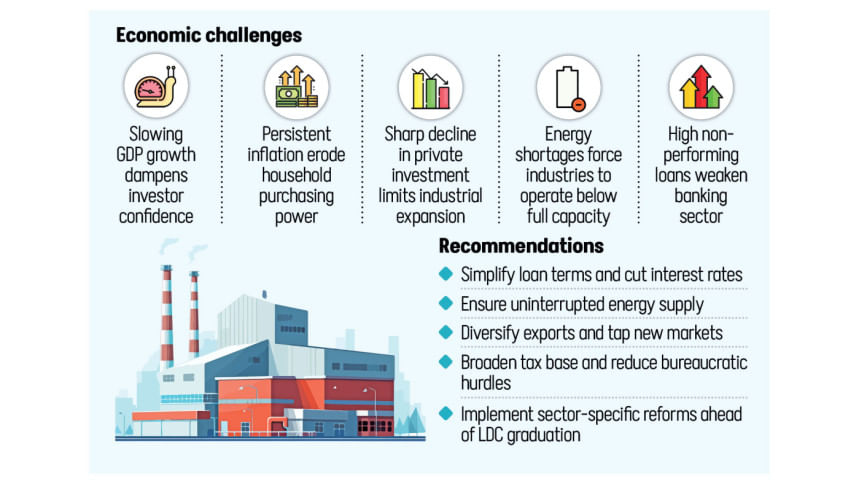Slowing growth, weak investment strain economy: DCCI

Bangladesh's economy is grappling with multiple challenges, including slowing growth, stubborn inflation, and a sharp fall in private investment, according to the Dhaka Chamber of Commerce & Industry (DCCI).
In its report "Bi-Annual Review: Current State & Future Outlook of Bangladesh Economy (H2 FY25)", the chamber attributes the strain to a mix of global headwinds and domestic policy challenges, urging swift and strategic government action to prevent a deeper crisis.
"Private investment dropped to 22.48 percent of the GDP in FY25, the lowest in the last 5 years. Both the opening of LCs and the import of capital machinery have declined," said DCCI President Taskeen Ahmed while presenting the review report at the chamber's office in Dhaka yesterday.
"Strengthen law and order and ensure uninterrupted and reliable energy supply to improve the business environment," he added.
The report noted that in trying to curb inflation, the government has squeezed private sector credit and dampened economic activity, creating a medium-term crisis. A multimodal approach is now needed to tackle both issues simultaneously.
To restore investor confidence, it recommended stabilising the banking sector, ensuring political stability, and removing bureaucratic bottlenecks to improve the ease of doing business.
Growth is being further undermined by a severe credit crunch, with private sector lending expanding by only 6.4 percent in June 2025, the lowest in 22 years.
The energy crisis is compounding matters, with a daily gas supply shortfall of more than 1,000 MMCFD forcing industries, including the crucial readymade garments (RMG) sector, to operate below capacity, the chamber noted.
It stated that the financial sector is also under acute stress, with non-performing loans (NPLs) reaching Tk 5.3 lakh crore -- over 27 percent of all outstanding loans. This erosion of confidence has spilled over into the capital market, where the DSEX index fell 7.2 percent in June compared with December 2024.
To address the challenges, the DCCI proposed easing loan terms and lowering interest rates to spur investment, accelerating export diversification, and ensuring uninterrupted energy through long-term LNG contracts and expanded local gas exploration.
The report raised particular concern over Bangladesh's upcoming graduation from Least Developed Country (LDC) status, saying the country is ill-prepared for the loss of trade privileges.
The chamber suggested formally seeking a three-year deferment to the graduation for strengthening competitiveness and devising a robust transition strategy.
It highlighted the urgent need for structural reforms, including broadening the tax base, cutting bureaucratic hurdles, and adopting sector-specific strategies to navigate the post-LDC era.
Without decisive action, it warned, Bangladesh's economic resilience and progress in poverty reduction are at serious risk.
The report noted that key export sectors are already showing signs of stress. RMG exports, the crown jewel of the sector, declined by 2.16 percent in the second half of FY25.
The leather sector, the second-largest exporter, also contracted and remains barred from premium Western markets due to compliance failures, leaving most exports destined for China at lower prices, it added.
Monzur Hossain, a member of the General Economics Division (GED), said the interim government is continuing the graduation process, with several committees working on it.
"Readiness for LDC graduation should not be confined to the government alone; it also requires active preparation from the private sector," he said.
He noted that graduation could create opportunities in export diversification, supply chain development, high-end production, and SME growth. However, the final decision will rest with the next government.
Mustafizur Rahman, a distinguished fellow of the Centre for Policy Dialogue, said Bangladesh may request an extension, but such a proposal must be approved by the United Nations General Assembly.
To justify the extension, the country would need to show weaker performance on three key indicators.
He explained that achieving a per capita income of $1,300 demonstrates readiness for graduation, whereas Bangladesh currently stands at over $2,800.
"So, even if we seek an extension, we must continue our preparations," he added.

 For all latest news, follow The Daily Star's Google News channel.
For all latest news, follow The Daily Star's Google News channel. 



Comments